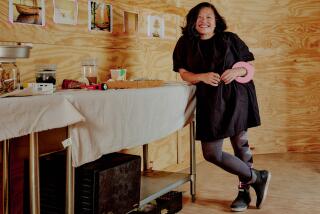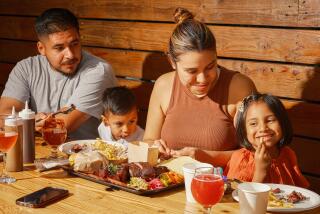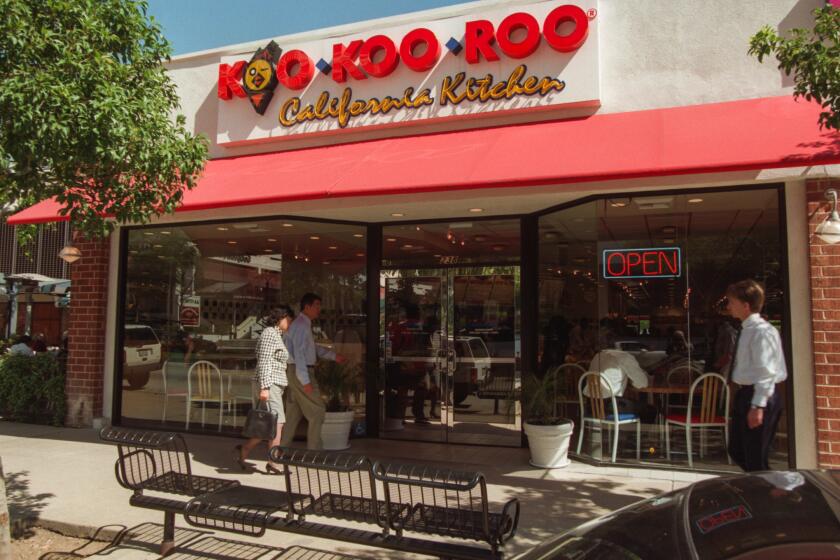In the aisles of 99 Ranch Market (or ‘Ranch 99’), a grandson remembers his grandmother
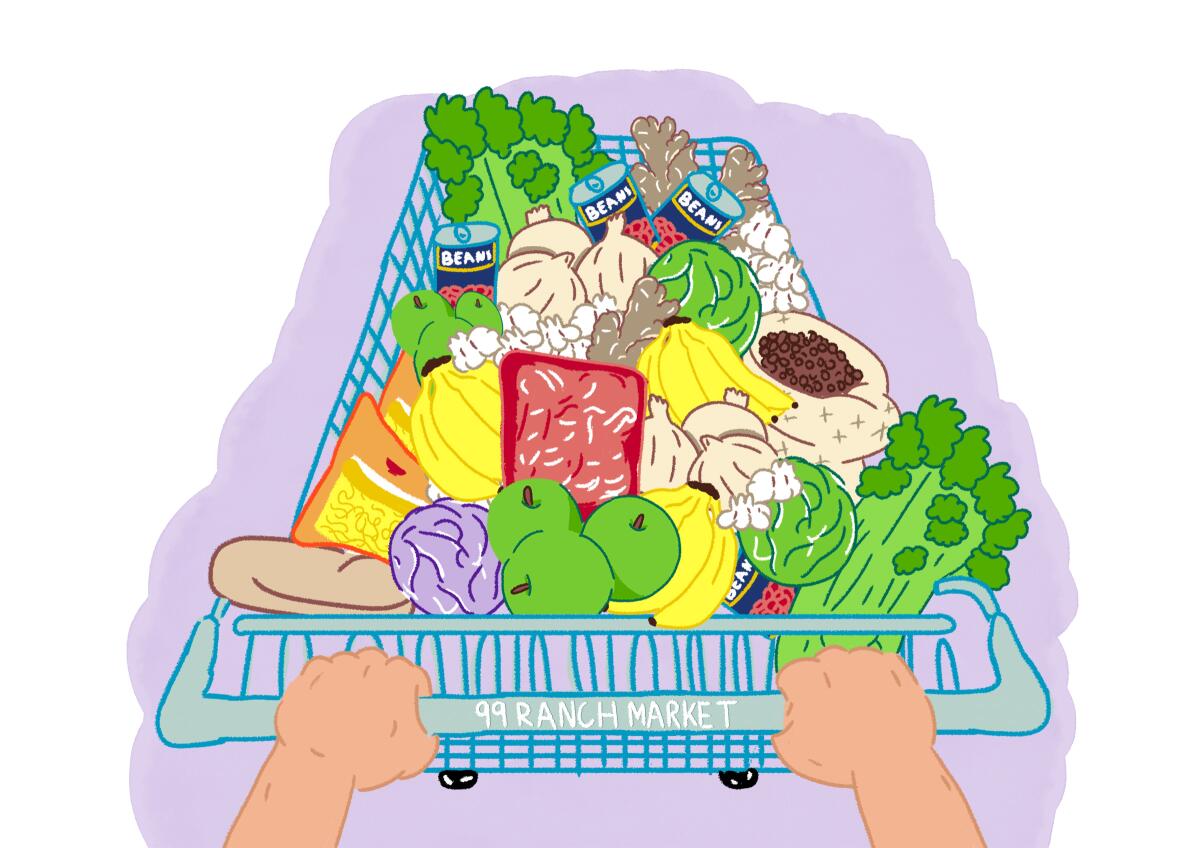
I’m not sure how to start an appreciation for 99 Ranch Market, so I’ll begin with an old receipt that my mom found going through my grandmother’s stuff after she died in October. The receipt is from six years ago, from the 99 Ranch (or “Ranch 99,” as my grandmother would call it) in Van Nuys.
The receipt is so perfectly representative of the dozens of trips I took there with Pau Pau (the Cantonese name for your grandmother on your mom’s side) over the years that I feel like I’m in the store and can see where every item on the receipt is located: Cooking wine. A white onion. A medium-large claw of ginger root. Two or three bananas that she’d separated from a larger bunch (she never bought an entire cluster). Cantonese zongzi from the deli section. Sticky rice dumplings wrapped in bamboo leaves. Rock sugar for the red bean soup she liked to make and a container of pumpkin seeds.
As my grandmother held my arm, we would amble carefully through the sliding doors and encounter the familiar, vaguely dried-fish smell of the store. Past the stacked boxes of whatever rice cracker or beef jerky was on sale in the circular that week, past the in-store branch of East West Bank, we’d begin in the produce section and take an unhurried loop around the store, like Olympians on the world’s slowest victory lap, putting things into a cart and ticking them off of her mental checklist.
All 99 Ranch stores are fun to explore. A good place to start is the bakery section, with shelf after shelf of loaves of sliced bread that’s specifically for toast, not sandwiches. The loaves come in different flavors — red bean, taro, walnut raisin — and are so tall, shaped like high, arched doorways, that they’re minor miracles of science. And they’re soft — unreasonably, almost disquietingly soft. An airy slice can be pinched together into nothingness; it makes Wonder Bread look like a dense Westphalian rye.
From there, you can move to the deli and peruse the prepared foods — chewy marinated beef tendon, sautéed squid, bamboo shoots with mushrooms. At the hot bar you can get a quick lunch — mapo tofu or spicy eggplant with rice or fried noodles — or something a bit more luxe, like a whole roast duck or a slab of honey barbecue pork.
After that? Wander. Explore the miles of soy sauces and rice vinegars; varieties and flavors of instant noodles beyond your wildest fantasies. Jars of pickled radish; heavy bags of Kokuho Rose rice; yakisoba noodles; six varieties of Spam, and then a dozen other brands of luncheon meat that aren’t Spam — with names like Fortune, Roxy and Celebrity. Voluminous tanks of live tilapia and Dungeness crabs; parts of a pig you won’t find at your Albertsons — kidneys, stomach and skin.
::
Part of my job, for the several years Pau Pau and I both lived in L.A., before she moved in with my parents at the end of her life, was to drive her around. That’s Grandson 101: Make sure Grandma gets wherever she needs to go.
Not that there was an enormous variety of places she frequented. I can name pretty much all of them: Kaiser Permanente, the post office, occasionally the airport when she would visit family in Hong Kong and, most frequently and important, the store.
Sometimes she’d call me when she wanted to buy groceries. Other times, I might get an email with an all-caps subject line: “NEED A RIDE” or just the alarming, one-word “HELP.”
Pau Pau lived within walking distance of a Ralphs, a Gelson’s, a Walgreens and a decent convenience store. But she didn’t like going to those places; she usually wanted to go to 99 Ranch.
(And Costco. Grandmas like deals, and she was no exception. Although she liked 99 Ranch, if she could get instant noodles cheaper at Costco, you’d better believe she’d fully flip allegiances. Before Costco, she used to go to Fedco, a Southern California department store chain that opened in 1948 and was basically the original Costco.)
We would sometimes talk about food or grocery store preferences, and she would reply in her characteristic way, which was to indicate that you were at the very end of a conversation, rather than the beginning or middle of one, and that she was having the final word.
“Anyway — I’m Chinese,” she said. “I like Chinese food.”
Which makes sense. Why wouldn’t you want to go to a store that sells the food you grew up eating? 99 Ranch and its parent company, Tawa Supermarket Inc., were founded by Roger Chen, an immigrant who wanted to eat familiar food in a new country. He used to visit Southern California in the 1970s importing cars for his native Taiwan before settling in Orange County with his family in 1983.
Seeing an opportunity to cater to the tastes of Asian immigrants in the area, Chen opened a supermarket in Westminster in 1983 and another the following year. The stores were successful, and the chain slowly grew to what it is today — 55 locations in 10 states. It seemed a lot of people wanted to be reminded of home.
Pau Pau, who moved to the U.S. from Hong Kong in 1947 and made her home in Los Angeles for 65 years, missed home too, although she rarely vocalized that specifically. Rather, she expressed it through things she ate: that red bean soup sweetened with rock sugar; soup made with pork neck bones and a slew of vegetables; lap cheong heated on a steaming pot of rice. And at 99 Ranch, or Ranch 99, she could replicate some of those flavors.
::
A quick side note about the name 99 Ranch. The first thing to know is that in Chinese numerology, nine is a lucky number. It’s nowhere close to eight, the supremely lucky number, but it’s still pretty lucky. The word for nine, jiu, also sounds like the word for “long” — so there’s an element of longevity and long life. It’s also considered an imperial number. There are nine rows of nine nails on the doors to the Forbidden City, for example.
The other thing to know is that, while the name of the chain is and has always been 99 Ranch, that doesn’t stop a lot of people — including my grandmother and mom — from calling it “Ranch 99.” A quick Google Trends search shows that in California, 30% of searches are for “Ranch 99” versus 70% for “99 Ranch.” And in Washington state, there are actually more searches for “Ranch 99” than for the correct name of the store.
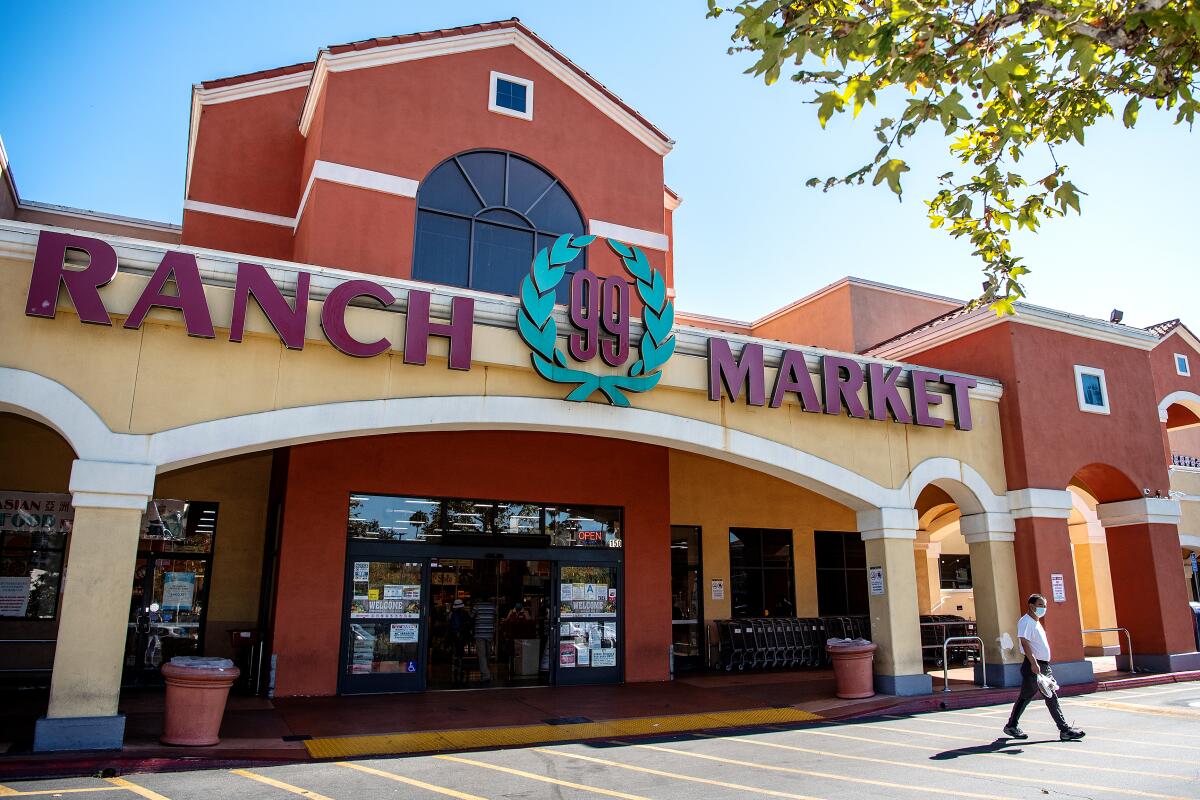
There’s really only one explanation, which has been explored on Reddit threads and social media. In some locations, the signage on the front of the store simply reads 99 Ranch Market. But in others, the number 99 is placed above and/or directly in between the words “Ranch” and “Market.” I imagine it’s just to mix up the design a bit, but when reading left to right, those signs say “Ranch 99 Market.” If there’s another plausible reason for this transposition, I haven’t heard it.
::
A typical Saturday afternoon might look like this: Head up Sepulveda Boulevard to Costco to buy a few things: fruit, coffee, vitamins, printer ink. After that, head over to Sam Woo’s to get some lunch. Sam Woo’s is a busy Cantonese barbecue place with big slabs of red-tinged pork and sad-looking ducks with S-shaped necks hanging from hooks. It also didn’t take reservations, which meant Pau Pau had a chance to show off a little.
She’d cruise in, disregarding the sign-in sheet and crush of waiting patrons, and go directly up to a server and say something in Cantonese. We usually were seated almost immediately, even if it meant sharing a table with strangers. Then we’d make the short walk to 99 Ranch, which was in the same mini-mall. After that? Maybe the hardware store. Maybe Ken Crane’s (R.I.P.) — the afternoon was ours.
Last week, I went to 99 Ranch with my mom in Milpitas — “the good one,” according to her. It’s a huge store, far bigger than the one in Van Nuys, but with a familiar layout. Hot food items on the far right side; tanks with live bass and spot prawns in the back; Chinese herbs and liquor locked behind glass sliding doors near the lottery ticket machine in the front.
We bought a few things — pork bones, a package of dried dates, ginger — to make my mom’s version of one of Pau Pau’s favorite soups. It’s a basic, comforting broth that’s homey and so totally uncomplicated that I can tell you how to make it right now:
Roast the bones in the oven on a sheet pan for 45 minutes. (Pau Pau would start with the raw, bloody bones ; my mom roasts them first.) Add them to a stock pot with cold water. Add plenty of ginger and a little garlic. Add a few dried dates. Then clean out your fridge. Toss in half an onion, some celery tops and whatever else you’d like to use up in the produce drawer. Simmer for several hours. Season to taste with salt and white pepper and strain.
As a kid in suburban Chicago, I didn’t grow up particularly embracing Chinese culture — and I don’t think my mom would mind my saying that when she and her brothers were kids, they didn’t either. The rush to embrace came later, as Pau Pau became older and we all realized a terrible truth: She was essentially our family’s last remaining link to China. The last person born there, the last person who really knew the stories, the last person who really knew the language.
And so, over the last couple of decades, we tried to make up for lost time: documenting the stories, diving into the family tree, recording interviews with her. When she was diagnosed with cancer last summer, every moment became one you wanted to put in a time capsule forever. But the end came so fast; she was gone in two months. I miss her more than I’ve ever missed anyone.
I don’t want to romanticize and overstate the importance of 99 Ranch in our lives — it wasn’t some profoundly meaningful experience every time we went — but I don’t want to understate it, either. It was a small but important way for her to connect, through food, with her past. And it allowed me to connect, in a small but important way, with her.
Now that she’s gone, that connection is even more important. Every time I set foot in a 99 Ranch, from now until forever, I will think about her. And although that doesn’t make me miss her less, as I sit here finishing a bowl of her soup, there’s some comfort in knowing that.
More to Read
Eat your way across L.A.
Get our weekly Tasting Notes newsletter for reviews, news and more.
You may occasionally receive promotional content from the Los Angeles Times.

